LGBTQ representation in Indian Parliament: The LGBTQ community in India has long struggled to secure adequate representation in all spheres, with many issues remaining at the forefront of political discourse. However, only a few voices are heard when it comes to seeking representation for the queer community in the Indian legislature.
The historical perspective offers a stark reminder of this underrepresentation and lack of inclusivity in the country’s highest legislative bodies, with only a handful breaking through the barriers.
The turning point came in 2018 when the Supreme Court of India decriminalised Section 377, a historic moment that signified progress in the fight for LGBTQ rights. But, as the LGBTQ community and its allies quickly realised, this was just the beginning of a long journey for their recognition.
Also Read: Gay couple get engaged in front of Supreme Court day after same-sex marriage verdict
A recent Supreme Court verdict on same-sex marriages underlined a crucial point: only the Parliament or the legislature possesses the authority to institute new laws. This ruling further emphasised the push for legislative action, particularly concerning LGBTQ rights, as the Supreme Court clarified its limitations in amending existing legislation like the Special Marriage Act (SPA).
The absence of LGBTQ representation at the national level is a matter of grave concern. The Indian Parliament holds the primary authority to enact and amend laws, making the need for inclusivity more important than ever.
In September 2020, Revanth Reddy, MP from Telangana’s Malkajgiri constituency, started an online petition demanding that the Central Government reassign the reservation that was previously allocated to the ‘Anglo Indian Community’ to the ‘Transgender Community.’ The petition highlighted decades of neglect and called for transgender representation in Parliament and State Assemblies through nominations and elections.
Also Read: Hope and despair: LGBTQ+ community split over Supreme Court’s refusal to recognise same-sex marriage
The petition read, “For the past 70 years, we have ignored the transgender community of more than a few million people, and the same will continue for several decades if notable interventions are not made. It is important that we bring them to Parliament and State Assemblies by nominating them and then gradually through the process of elections too.”
“We almost have no elected members of the transgender community in any of the State Assembly or our Parliament. No political parties give them a ticket, almost none from the community are office-bearers of any political party,” Reddy stated in the petition.
Despite numerous vocal calls for transgender inclusion in the Lok Sabha, progress remains elusive.
Also Read: Supreme Court refuses to recognise same-sex marriage in 3-2 verdict
One historic moment occurred in 1998 when Shabnam Mausi made history as the first trans woman Member of the Legislative Assembly (MLA) in the Madhya Pradesh Assembly Elections. However, her political journey was far from smooth. She faced rejection when twice denied membership by the Congress party, encountering disrespect due to her gender identity.
While this achievement was a ray of hope for the LGBTQ community, progress in the realm of political representation has been frustratingly slow.
After Shabnam’s victory, Madhu Kinnar, an independent Dalit candidate in Chhattisgarh, secured a victory in the 2015 municipal elections, becoming the first transgender Mayor. Earlier, the courts invalidated victories by transgender candidates in 2009 and 1999 when they won seats reserved for women.
In January 2018, Apsara Reddy, a 37-year-old politician and journalist, became the first trans woman to hold office in the Congress as the national general secretary of the All India Mahila Congress. She pointed out the need for a broader political vision to promote transgender candidates.
M Radha, the sole transgender candidate in the Lok Sabha elections from Tamil Nadu’s Chennai South constituency lost the election. Yet she remains resolute in her determination to improve living conditions for the transgender community. According to Radha, transgender individuals are making their mark in various fields but are still largely absent from the political arena.
According to the Center for Gender and Politics, five other transgender individuals, including Chirpi Bhawani of the Aam Aadmi Party and Kajal of the Bahujan Samaj Party, contested polls in 2019. Several transgender individuals secured positions in political parties but did not get into electoral battles.
The inconsistent progress in transgender political representation reflects the growing obstacles they face in breaking down political barriers and securing support from political parties. However, the transgender community continues to fight for destigmatisation, humanisation, acceptance, and the recognition of their rights.
Equal representation is not only a matter of fairness but a necessity for building a more inclusive society. The LGBTQ community’s underrepresentation in the political sphere raises critical questions about the potential transformative power of such a legal shift.
As the nation still struggles with these issues, the central question remains: Will India’s Parliament enact laws that truly reflect the principles of inclusivity and diversity?

